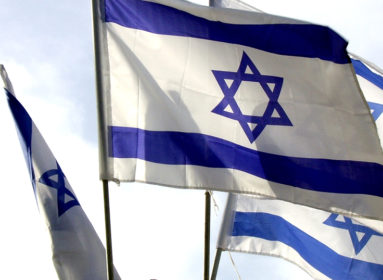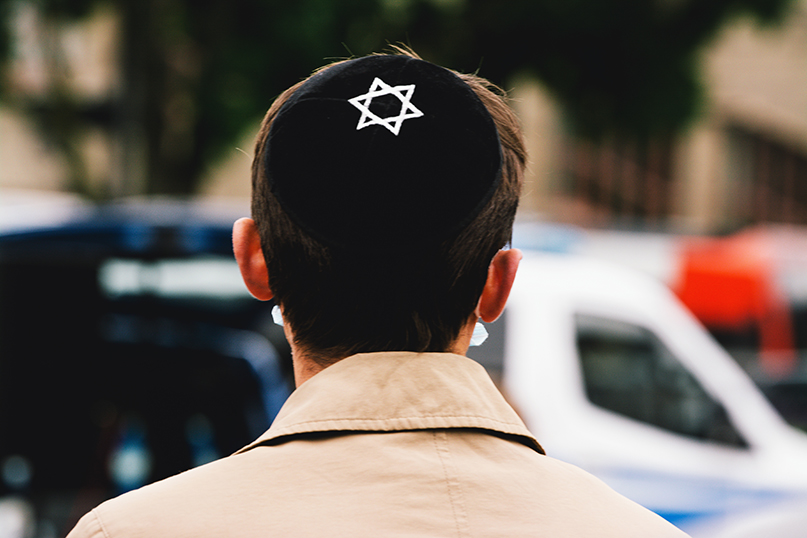
Many American Jews are hiding their Jewish identities amid a wave of antisemitic incidents
By Shira Hanau and Ben Sales
(JTA) – When Ricki moved into her new ground floor apartment in New York City less than a year ago, she felt perfectly comfortable placing a mezuzah on the front door for all who passed through the lobby to see.
Today she feels less sanguine about that choice.
Ricki hasn’t removed the mezuzah, but she has asked the building’s management to put bars on her windows. And she’s still considering taking down the Jewish symbol.
“When I put it up I was really proud of it,” Ricki said, declining to use her last name due to privacy concerns. “I’m not embarrassed of being Jewish, I knew when I put it up that people would see it. But I really didn’t think twice about it.”
She’s not alone in having second thoughts now.
For the past two weeks, Jews across the United States have been attacked because of the fighting in Israel and Gaza. In Los Angeles, pro-Palestinian attackers threw punches and bottles at diners at a sushi restaurant. In New York’s heavily Jewish Diamond District, protesters of Israel threw fireworks from a car amid a violent street altercation.
As footage of those attacks and others spreads online, American Jews say they are feeling a renewed anxiety around identifying themselves publicly as Jews. Some are taking off their kippahs or Star of David necklaces. Others, like Ricki, are considering the removal of their mezuzahs. Some are mulling whether it’s safe to walk into synagogue.
That anxiety has long been familiar to Jews in Europe and elsewhere in the world. At times it has reared its head in the United States, like in 2018 following the massacre at the Tree of Life synagogue in Pittsburgh. A survey last year by the American Jewish Committee found that nearly a quarter of Jewish respondents avoided wearing or displaying something that would mark them as Jewish at some point in the previous two years.
This week, American Jews feared they could be targeted due to an association, real or imagined, with Israel and its actions regarding the Palestinians. For some American Jews, that fear is manifesting in decisions to tamp down their public displays of Jewishness as a way to protect themselves.
“On the one hand I want to be a proud Jew and express to the world that that’s something I’m passionate about,” said Drew Feldman, a theater director and writer who has taken to wearing a baseball cap more often in recent days rather than his kippah due to the tension he feels around the conflict in Israel. “On the other hand, the Torah says we have to put life above all else.”
Feldman, who spent the past several months living in Tennessee, first started wearing a kippah regularly in 2015 as he became more interested in his Judaism and more observant. He recently called his rabbi to discuss whether it would be appropriate to stop wearing it for a while.
“When I’ve traveled to Europe, I’ve done that because I’ve been told it’s a safer thing to do in places like France,” Feldman said. “This is really the first time outside of traveling to Europe or elsewhere that I’ve put on a different hat or baseball cap and not done it simply for fashion, done it out of a sense of anxiety or maybe fear.”
Rabbi Adir Yolkut of Temple Israel Center in White Plains, New York, said he had never seriously worried for his safety walking to synagogue on Shabbat morning wearing a kippah.
“I just sort of had a fleeting thought that was not so fleeting, is this something I should be nervous about?” he said. “Should I take more precautions than I usually need to? Because it feels like you don’t know where it’s coming from.”
On Friday, May 21, the Diamond District was calm and host to a typical range of Jewish characters: Men in kippahs stood on every corner, a group of haredi Orthodox boys fist bumped a store owner dressed in jeans and a T shirt, a group of Chabad-Lubavitch emissaries approached bystanders asking “Are you Jewish?”
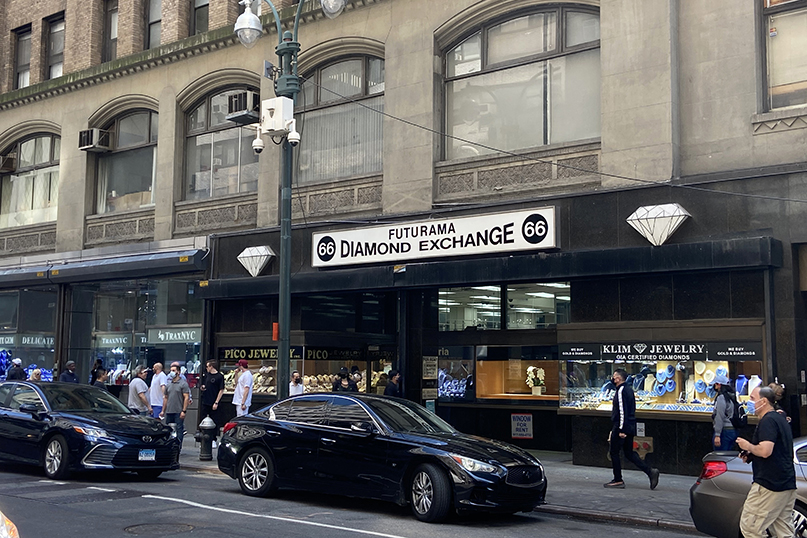
But there was a smattering of police throughout the neighborhood’s few blocks, and some Jewish store employees were wary.
Emanuel Shimunov had witnessed the previous day’s violence through his store window. According to Shimunov, it started when a Jewish boy said “Peace in Israel” to the pro-Palestinian protesters driving through the street. They began cursing at him, then fought with a man who came out to protect the boy.
“There are a lot of people who will be affected,” said Shimunov, a descendant of Bukharan Jews. “There are a lot of people like that.”
Ian Steiner, who lives on Manhattan’s Upper West Side, which has a large Jewish population, doesn’t attend synagogue frequently. But after seeing the news about attacks on Jews in New York City and Los Angeles, he decided to offer to escort other Jews to and from synagogue if they felt unsafe walking alone.
“I’m a bigger guy and I’m not scared,” he said. “I know I’m strong and I’m young and agile, and if an older person or someone is afraid to go to shul or to practice their religion, I have the duty to do something to make sure they feel safe.”
The Secure Community Network, which coordinates security for Jewish institutions nationwide, has received dozens of reports of antisemitic incidents over the past week, said its CEO, Michael Masters. He said a big difference between what happened this week and during the last Gaza War in 2014 is that social media is playing a larger role in fueling discord regarding the Israeli-Palestinian conflict in the United States.
“We’ve seen an incredible surge in online incidents and events, online acts of targeting or hate speech, as well as the ability of the [Jewish] community to share information about incidents and events,” he said. “If we look at the process by which people are motivated to violence, whether they are someone who follows supremacist ideology or they support Hamas, there’s absolutely no doubt that the proliferation of messaging on social media plays a role.”
The spate of attacks on Jews has given Jewish security officials deja vu to 2019, when antisemitism spiked in and around New York City and Jews suffered two lethal attacks.
Evan Bernstein, who runs the Community Security Service, a volunteer synagogue security organization, said when it comes to attacking Jews, the incidents in New York this week make it seem like the city has picked up from where it left off before last year’s pandemic restrictions took people off the streets. The attacks also come as many synagogues are transitioning back into holding services inside their buildings following a year of worshipping outdoors or virtually.
“So many people in the Jewish community thought that we just didn’t have to deal with this kind of antisemitism,” said Bernstein, whose organization is based in New York. “I kind of knew COVID was going to be the pause button on that. I’m sad that I’m right.”
Regarding antisemitism, while Bernstein said “the climate around us is very different” than it was a couple weeks ago, he isn’t giving his volunteer security patrols any special instructions for the coming Shabbat. Nor does he think New York has reached a point where people necessarily need to take off their kippahs in public, as many Jews do in Europe.
“I don’t think we should stop being openly Jewish,” he said. “If we get to that point in the United States where we can’t wear our yarmulkes comfortably and openly, we’re at a whole different level, and I hope that’s a conversation we don’t have to have.”
To Ricki, the fear that she may have to take down her mezuzah feels ironically painful. Grappling with the decision this week, she thought of her grandparents, who were Holocaust survivors. Growing up, she had felt safe as a Jew in America. Antisemitism had never felt like such an immediate threat as it did to her now in downtown Manhattan.
“I was always told that antisemitism is really real, but as someone in the millennial generation, maybe I was blind to it,” she said. “But now I’m like wow, I see it.”
Gabe Friedman contributed reporting.
‘Not good for my mental health’
Jewish Instagrammers struggle amid Israel-Gaza conflict and antisemitic violence
By Philissa Cramer
(JTA) – Ilyssa Minkus usually spends a chunk of her day on Instagram. That’s where she promotes her business producing party decorations and Jewish-themed crafts.
But after Israel began trading bombs with Hamas in Gaza last week, she tried – often without succeeding – to stay away.
“I don’t want to go on because I’m just bombarded with anti-Israel message after anti-Israel message,” Minkus said a week into the latest conflict. “I felt so differently when the [Jan. 6] attack on the Capitol happened and when influencers were not addressing the issue. But this is something where I am holding my breath when somebody I like posts something.”
At one point, an influencer Minkus admires posted a video titled “Gaza is Under Attack.” Minkus reached out to let her know that the post felt one-sided and didn’t acknowledge the role that Gaza’s leadership had played in instigating the bombing.
Minkus, who lives in Chicago, wasn’t the only person to reach out: The influencer took down the video, saying that while she thought the post was clear and unbiased, she had heard from many people who disagreed.
Minkus felt relieved that her advocacy had worked – but then she looked around and across her feed saw post after post that felt similarly slanted, or worse. She didn’t reach out to anyone else.
“It’s not good for my mental health,” she said. “I worry that I won’t have the correct answers to rebut what somebody says. And that makes me anxious.”
Minkus’s calculation was one that Jews on social media have made countless times over the past two weeks as an explosion of tensions thrust the Israeli-Palestinian conflict into international headlines. Influencers who are not Jewish or Palestinian and more often post about parenting, pop culture or their personal lives have posted about the conflict, sometimes sharing misinformation, while prominent Jewish account operators have waded into the conflict, sometimes with hesitation – and sometimes received antisemitic comments in response. Meanwhile, their followers have found themselves having to weigh the costs and benefits of taking a stand or combating misinformation on an incredibly fraught topic.
And now, with a ceasefire in place but antisemitic incidents cropping up across America, Jews on social media fear their decisions are becoming even higher-stakes.
“It’s important for people to know how exhausting and draining and soul-destroying it is to be constantly advocating for your right to exist, and your children’s right to exist and their physical, and your physical, safety, with this torrent of people who don’t understand the ways they’re inciting violence because they feel like they have to make a statement about things they don’t know anything about,” said Meg Keene, a Jewish businesswoman in Oakland, California, who frequently shares information about Judaism and Israel with the 6,600 followers on her personal Instagram account.
“The only way I can keep it together is I won’t do one to one,” Keene said. “I won’t fight in the comments or DM people and say this is why you are wrong. I think this is useless and draining.”
The anxieties are most pronounced on Instagram, the social photo app owned by Facebook that emerged as a hotbed of activism in the past year and is widely used by women. During the racial justice protests following the murder of George Floyd, Instagram slideshows that drew on corporate aesthetics became a dominant tool for conveying information – and sharing them became a signifier for allyship.
That style has now become ubiquitous, and over the past two weeks influencers, advocates, news organizations and just regular Instagrammers have flooded the app with memes and slides about the Israeli-Palestinian conflict. In one prominent example, model Bella Hadid shared a graphic that featured two women, one of whom asks, “So aren’t Israelis and Palestinians just fighting over religion?” The other woman responds: “They are not ‘fighting,’ Israelis are the oppressors and Palestinians are the oppressed and the situation is about anything but religion.” That post spawned a trove of parodies representing every conceivable ideological position on the conflict and region.
Instagram’s potency is also a liability, writes Emily Burack in an Alma essay titled “So you want to post about Israel and Palestine on Instagram.” Burack argues that many users trust content just because it is aesthetically pleasing and shareable, even when it is false, and that small images – even a series of them – are inadequate to summarize what’s going on in the Middle East.
“When it comes to one of the most fraught and complex conflicts in the world, which has been unfolding over the course of thousands of years, an infographic alone is just not going to cut it,” she writes.
Burack advises to use Instagram as a starting point for learning, not the only source of information.
That may not be practical for many people, especially those who may not be passionate or informed about the Middle East but might feel pressure to take a stand nonetheless – such as the influencer Maya Zemel reached out to this week.
Zemel, a Los Angeles occupational therapist who typically follows parenting accounts, was unsettled by a post she saw from an influencer with more than 200,000 followers. A white woman who posted extensively about how to diversify a home library and raise anti-racist children a year ago, the influencer shared information about how to help Palestinian children.
The daughter of Israeli immigrants, Zemel thought of her relatives huddling in bomb shelters in Israel and sent a message encouraging the account’s operator to include Israeli children in future posts about the conflict. The response surprised her.
“She basically wrote to me that she felt a tremendous amount of pressure to post something and she didn’t want to – a strong amount of pressure from her followers” to post in support of Palestinians, Zemel recalled.
Some Instagram users have resisted the pressure to post about the Israeli-Palestinian conflict. Last week, for example, Jake Cohen, a Jewish food blogger, posted a message telling his 345,000 followers that they would have to go elsewhere for posts about the conflict.
But many others have weighed in despite not previously engaging on the issue. Whitney Fisch, a longtime Instagram influencer who posts about Jewish food and parenting, said she attributed the flurry of misinformation to people wanting to take as strong a stand now as they did last year about racial justice but not understanding the unique context of the Israeli-Palestinian conflict.
“It is more important to so many people that they appear to be active and liberal and educated as they made their persona online to be,” Fisch said. “That’s more important than doing the research and supporting a Jewish community. That’s my theory.”
Fisch, the executive director of the Hillel at Miami University in Ohio, said she had not observed bullying or conflict related to Israel on campus in recent weeks. But her Instagram feed showed a different story.
After a friend posted a video from a pro-Palestinian march with a caption that included the words “From the river to the sea,” Fisch reached out to let her know that the phrase is painful to many Jews, who understand it as a rallying cry for those who want Israel not to exist at all. Fisch said her friend was apologetic that she had amplified something she didn’t understand.
“But the thing that killed me is I’m preaching to the choir,” she said. Like Minkus, Fisch was dismayed about her limited impact and how many other ideas were circulating that she had no power to counter. “I just need someone to call out Hamas. Anyone.”
Keene, too, said she had been inspired in part because of the undertones she saw in some pro-Palestinian content that entered her feed. She said she saw herself as a bit of an unlikely Instagram advocate for Israel, since she is a progressive on most issues and has always belonged to liberal synagogues where members are attuned to the plight of Palestinians. But Keene said the misinformation she had encountered had unnerved her.
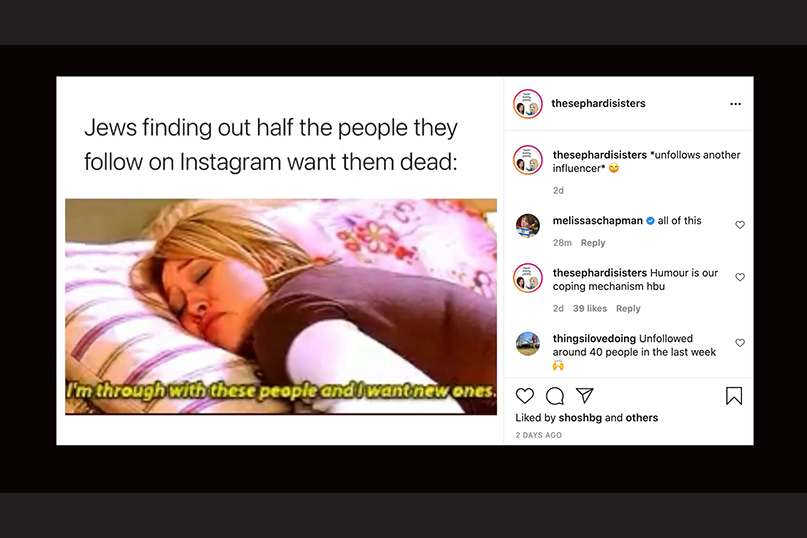
during the recent Israeli-Palestinian conflict. (Screenshot)
“The way I have seen the left online in the last week is not dissimilar to the way the right has behaved around QAnon,” Keene said. “The left is passing along misinformation graphics, all but quoting Hamas talking points.”
Instead of battling other influencers, Keene has been producing content of her own, adding her own insights to slides produced by a handful of other accounts she trusts. She has been active on social media for well over a decade. So she has developed a thick skin: Unlike some less seasoned influencers she knows, Keene doesn’t check the messages that roll in from people she isn’t already in touch with – she knows they are likely to include antisemitism and doesn’t want to see it.
“More women than not are thinking I can’t do this right now, I can’t do this anymore,” Keene said. But, she said, “I’m built for this. It’s miserable but someone has to do the work. There are a handful of us and we’re leaning on each other.”
Keene said she knows that she has helped some Instagram users feel more informed about Judaism and Israel issues because they have told her so. But she also said what she sees is often dispiriting.
“You are seeing people that you love and care about who are reading your stories … and then you are turning around and seeing people you love and care about post exactly the thing you just warned about,” Keene said. “That’s very betraying and terrifying.”
For some, the response to seeing slanted or uninformed Instagram posts about the Israeli-Palestinian conflict is to unfollow, or tell the app not to show new posts from the people who created them.
The Sephardi Sisters, a Jewish account that does not typically engage heavily in Israel issues, posted a meme on Wednesday that took aim at the dynamic. Above a gif of Jennifer Aniston of “Friends” fame saying “I’m through with these people and I want new ones” were the words “Jews finding out half the people they follow on Instagram want them dead.”
In the comments, followers shared how many people they had unfollowed this week: 20, one person posted. Another counted 40; another yet 50.
“Heart is broken,” one commenter wrote, saying that it had hurt to see misinformation shared by “women and artists I looked up to and admired.”
But some say they feel that disengaging represents a form of concession – even if remaining engaged comes at significant personal cost.
“It almost feels like my responsibility to be vigilant,” said Zemel, the Los Angeles woman who took the uncharacteristic step of reaching out to an influencer this week. “I also feel completely helpless. It feels exhausting to know what to say.”
Hundreds rally for Israel in NYC following spate of antisemitic attacks
By Ben Sales
(JTA) – Hundreds of people rallied for Israel in New York City days after a ceasefire between Israel and Hamas in Gaza, and following a string of antisemitic assaults and harassment in the United States.
The demonstration on Sunday in lower Manhattan, organized by the Israeli-American Council and other pro-Israel organizations, principally featured traditional messages of supporting Israel. Speakers asserted that Israel and Jews in New York City faced a common enemy.
“We are here today against terror, united against terrorism,” said Tal Shuster, one of the event’s organizers, in a speech. “We do not accept any type of terror, not in New York, not in Israel, not anywhere in the world.”
The rally, one of 15 similar demonstrations organized nationwide, came after weeks in which Jewish communities across the country experienced antisemitism during and after the conflict in Gaza and Israel. In New York City, amid dueling pro-Israel and pro-Palestinian rallies on Thursday, multiple Jews were assaulted in the street.
In the days following, Jews across New York posted on social media about being threatened, harassed or otherwise attacked for being Jewish. The reports were reminiscent of a string of antisemitic incidents in New York in the months before the pandemic shut down street life globally. Nationwide, the Anti-Defamation League recorded an increase in antisemitic incidents in the first week of the Israel-Hamas fighting.
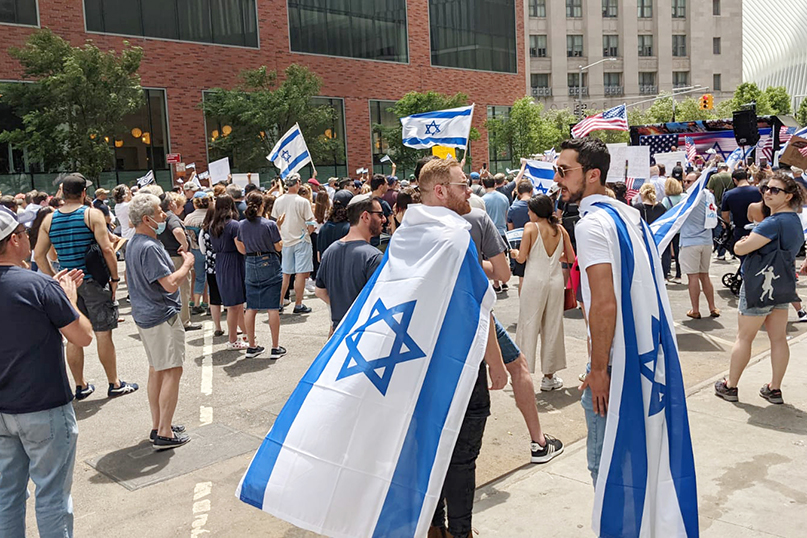
There were attacks on synagogues and individual Jews in other cities as well. Synagogues in Florida, Illinois and Arizona were targeted. Earlier in the week, two antisemitic incidents were caught on video in Los Angeles.
The antisemitic incidents have led some to refrain from wearing Jewish symbols publicly out of fear of being attacked. But people at the New York rally said that even though the news of the recent attacks concerned them, they hadn’t gotten to the point of taking off their kippahs or jewelry featuring Stars of David.
“I want to show the world that the Jewish nation is strong and will not give up, and to show that, walking with a kippa, I don’t need to be afraid,” said Gershon Abergel, an Israel who has lived in New York for 18 years and who wears a kippa.h “It’s strange but it will pass. I’m trying to be strong.”
Speakers at the rally, held near the National September 11 Memorial & Museum, condemned the antisemitism amid an event that, mostly, was focused on Israel. Upbeat Israeli music blasted before the event agenda got underway, and demonstrators wore shirts that said “I stand with Israel” and, in Hebrew, “Israel is in my heart.” The backdrop to the dais featured two signs that said “Hamas = Terrorists” and “Stop supporting Hamas.” The crowd cheered for the NYPD near the beginning of the event.
Curtis Sliwa, a Republican candidate for New York City mayor and the founder of the Guardian Angels, a volunteer crime prevention organization, showed up wearing his trademark red beret. On the sides of the crowd, Chabad emissaries wrapped tefillin on men’s arms. Across a barricade far from the crowd, a small group of anti-Zionist haredi Orthodox Jews, from the Neturei Karta movement, protested the rally. But the rally was devoid of the physical fighting that occurred at the rallies on Thursday.
Speakers included Israel’s acting consul general in New York, Israel Nitzan, as well as Rabbi Shmuley Boteach, the pro-Israel and conservative activist.
Peter Fox, a writer and pro-Israel activist, condemned Jewish extremists who assaulted Arabs in Israel in recent weeks at a speech at the rally. Elisha Wiesel, the son of Holocaust survivor and Nobel Peace Prize laureate Elie Wiesel, condemned “antisemitic Marxists” before saying that Israel and the Palestinians deserve to live in peace, and leading a chant of “Salaam Aleikum” – peace be with you, in Arabic – to emphasize the quest for peace.
“Jews are the oldest tribe but we cannot allow ourselves to be tribal,” Fox said. “Israelis and Palestinians alike deserve much better.”
Multiple antisemitic incidents reported over the weekend across US
(JTA) – At least four cases of intimidation or assault against Jews have been reported in the United States since Thursday, in a continuation of what many fear is one of the country’s worst spate in years of antisemitic violence.
On Saturday, six men assaulted and punched two Jewish teenagers in Brooklyn on 18th Avenue and Ocean Parkway, reported VINnews. The news site interviewed Mitchel Schwartz, the father of one of the teenagers. One of the men told the teenagers “free Palestine” and made additional references to Israel, the report said.
The report did not say whether the teenagers were hurt or whether they had complained to police. An Uber driver who witnessed the scene told the teens to get into the car and took them to safety, the report also said. The driver was Muslim.
On Friday, Israel and Hamas in Gaza agreed to a ceasefire that ended 11 days of exchanges of fire. That night, Luca Lewis, a 20-year-old professional soccer player who plays for the New York Red Bulls, said he was threatened by men holding knives who asked if he was Jewish, and who told him they would kill him if his answer were yes.
The incident happened in New York, he wrote on Instagram. A group of men passed him and a friend on the street when one of the men asked Lewis if he was Jewish, according to Lewis.
“I paused for a moment in confusion and thought about it, then I saw them withdrawing knives,” Lewis wrote in his post. “I obviously said no. The guy looked at me with such disgust in his eyes and said ‘Good’.”
This made Lewis angry and he asked what would happen if he were Jewish, he wrote. “‘I’ll beat the f*ckin sh*t out of you and kill you’,” Lewis quoted the man as replying.
Earlier last week, pro-Palestinian attackers threw punches and bottles at diners at a sushi restaurant in Los Angeles. In New York’s heavily Jewish Diamond District, protesters of Israel threw fireworks from a car amid a violent street altercation.
In Hallandale Beach, Florida a man directed antisemitic abuse in addressing a local rabbi and later emptied a bag containing human feces outside the rabbi’s synagogue on Friday, WSVN reported. Police are investigating the case. The report offered no information linking the incident to Israel. On May 14 a Hallandale Beach man reported having rocks thrown at him as he walked back from synagogue.
In Tucson, Arizona unidentified individuals hurled a large object through the glass door of a synagogue, Congregation Chaverim on Tuesday night or Wednesday morning, AZcentral reported. Police are investigating that incident, as well.
On Thursday, dueling pro-Israeli and pro-Palestinian demonstrations clashed in Times Square, where protesters from both demonstrations broke out into brawls.








 Southern New England Jewish Ledger
Southern New England Jewish Ledger